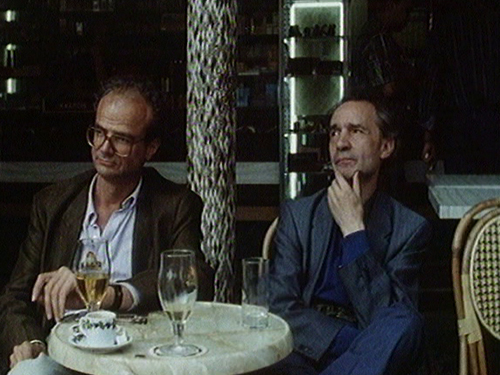
“In de films van Rivette vormen ontmoetingen het hart. Het gaat om personages die in een chaotisch netwerk met elkaar verbonden zijn. Zijn films zijn als choreografieën van menselijke relaties. Toch is hij graag alleen wanneer hij niet aan het filmen is. Dan zien vrienden hem in de verte lopen, op weg naar een cinema. Of zien ze hem de stilte van de filmzaal met zich mee naar huis dragen. Daney merkt op dat Rivette wellicht alleen is, maar dat hij vanbinnen bevolkt is. Tegen het einde van de film, wanneer ze ’s nachts op een dakterras zitten, komt deze belangrijke zin weer bovendrijven. Op een gegeven moment valt er een gat in de conversatie. De camera blijft bij het gezicht van Rivette en je ziet hoe het gesprek verdergaat, maar nu binnenin hemzelf. Zijn ogen schieten heen en weer alsof hij een boek leest.”
Nina de Vroome1
“The cinema is not a language... That was something that struck me when I suddenly saw the great silent films, not the later ones but the ones from 1915-20, Griffith and Stiller, not Lang and Murnau. They showed such a strong view of reality, which seemed possible at that moment, but later – as if there was a state of innocence that subsequently, irreparably disappeared. That was the first text I ever wrote. The title was, ‘We Are No Longer Innocent’, which I felt strongly. The more time goes on, the less innocent we become. Here we should use the great phrase of Kleist’s: “The only way to innocence is the long road via knowledge.” That’s our only chance.”
Jacques Rivette in Jacques Rivette, le veilleur (Claire Denis & Serge Daney, 1990)
“Jacques Rivette – Le veilleur is part of a television series that begun in 1964, and that was created for the ORTF (Office de Radiodiffusion-Télévision Française) by yet another important Cahiers du Cinéma critic, André S. Labarthe, along with André Bazin’s widow Janine Bazin. The original project was entitled Cinéastes de notre temps, and was composed of a series of portraits of filmmakers. One of the exciting aspects of this project was not just that it offered a close examination of such important filmmakers as Luis Buñuel or Robert Bresson, but also the fact that those who undertook the directing of the films were often established or burgeoning filmmakers themselves (see, for example, Jacques Rozier’s portrait of Jean Vigo). The relationship to Cahiers was also clear: although Labarthe directed many of the films himself, other critics from the magazine – Jean-Louis Comolli on Miklós Jancsó, Jean-André Fieschi on Pier Paolo Pasolini, Jean Douchet on Alexandre Astruc – also made significant contributions.”
Paul Grant2
“Claire Denis’ first-rate documentary about filmmaker Jacques Rivette, produced for French television, has many things to recommend it. The main interviewer is the great critic Serge Daney, who, two years before his death, converses with Rivette while relaxing in a cafe and strolling around Paris (Denis interjects a few questions toward the end); since both men were former editors of Cahiers du Cinéma, not to mention groundbreaking and highly articulate critics, they have a lot to discuss apart from Rivette’s filmmaking. Clips from many of Rivette’s major films (some of which remain difficult to see, like the legendary Out 1) are included, as are interviews with some of Rivette’s actors, such as Bulle Ogier and Jean-Francois Stevenin. Best of all, the film beautifully captures Rivette the man, as both solitary cinephile and exploratory filmmaker.”
Jonathan Rosenbaum3
- 1Nina de Vroome, Alleen in meervoud, Sabzian, 2018.
- 2“Jacques Rivette – Le veilleur”.
- 3“Jacques Rivette – Le veilleur”.